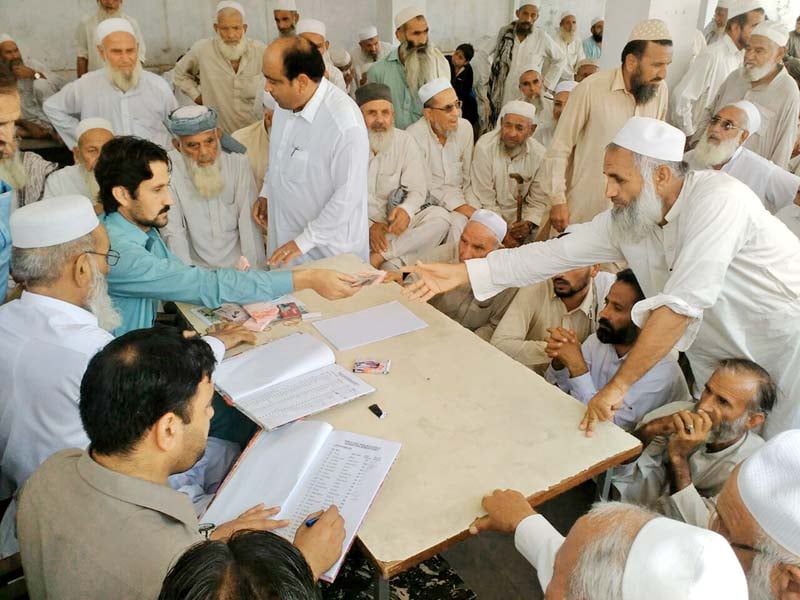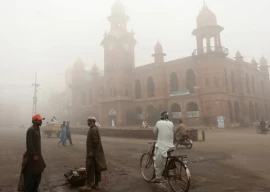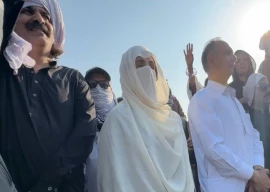
The Muajab and Lungi are hereditary tribal stipends which range from just Rs20 to several thousand and are distributed among their respective tribesmen. It is a key part of the tribal identity and its value is closely linked to a tribe’s standing and influence in the area – particularly when it comes to voting. But the tradition has been reduced to a ceremonial value in recent years.
Ismail hears his name and heads to the small table where the political administration makes the entry and hands him his money as per his tribe’s calculation. He returns and sits on the bare ground and starts drawing lines in the sand calculating shares.
“I have received my Muajab and Lungi combined,” he told The Express Tribune.
The tribal identity is interlinked with Lungi which is why no one will agree to forfeit it at any cost even if it is a penny,” he added when asked about its significance.
He added that even though militancy and economic opportunities have seen many tribesmen move out of the area, Ismail said that they had travelled to the agency just to collect their hereditary Lungi.
Bashir Khan, another tribal who had received the Lungi for his tribe, said that it was considered to be an honour to receive Lungi since it reaffirmed their stake to the area. But now, the perturbed Bashir said, it was considered more of a burden since it came with the massive responsibility of distributing it equally.

He added that in the past those who had lungi, also called Maliks, enjoyed high stature in the society. Bashir explained that only Lungi holders – awarded based on the number of people the tribe had - were allowed to vote for electing parliamentarians from the Federally Administered Tribal Areas.
Whenever elections were near, Lungi holders gained greater significance since the candidate which managed convince the most Lungi holders to vote for them was elected to parliament. This also meant that lungi holders managed to earn thousands during elections, Bashir added.
Apart from money, Malik’s and Lungi holders bartered votes for additional privileges such as authorization from the Political administration to verify documents such as domiciles, identity cards and even passports for tribesmen.
Malik Izat Khan a renowned notable of the Uthman Khel tribe and Lungi holder, did not agree with Bashir’s argument and contended that the token stipend was still an honour for them.
Izat had taken up the mantle from his elder brother who had inherited the Lungi from his father after their grandfather was awarded the title during the British era.
He explained that in the past there used to be few Lungi holders. But over time, their numbers increased after parliamentary candidates awarded Lungi to their supporter to boost their votes during elections.
This is why once a members elected for the national assembly from the tribal areas, they kept their seat for decades – such as Malik Barooz Khan from the Baizai tribe in Mohmand who managed to hold onto his seat from 1977 to 1997 thanks to the support of 3,174 lungi votes compared to the 2,017 Lungi votes of the Khwaizi tribes, 1,712 votes of the Uthman Khel tribe, 1,570 votes of Safi tribe, 885 of Haleemzai tribe, 639 in Tarakzai tribe.
But Izat explained that things changed in 1997 when the government abolished the Lungi votes and introduced universal adult franchise.
Meanwhile, Naveed Akbar Khan, the assistant Political Agent from lower Mohmand, said that the Malik system operated under the Frontier Crimes Regulation promulgated by the British.
Talking about the stipend, he explained that it is handed out once a year to notables among the tribesmen. Dilating on the difference between Muajab and Lungi, he said that the former was for the entire tribe, including sub-tribes. Lungi, on the other hand, is personal and its holder is not bound to disperse it amongst his tribe.
Shining light on the history of the Lungi and Muajab, Naveed said that prior to independence, Muajab and Lungi along with other allowances were awarded to tribesmen in Mohmand by the Afghan government. However, the Haleemzai and Tarakzai tribes were awarded these allowances by the British government after they sided with New Delhi against Kabul.
Tribes such as the Khwaizai, Baizai were provided with the Muajab and Lungi after they pledged allegiance to Pakistan and Mohmand Agency was formed in 1951.
The Safi and Uthman Khel tribes, who had been living in Mohmand agency for a long time but not considered as Mohmand natives, were awarded Muajab and lungi in 1985 based on their services to the government.
Published in The Express Tribune, October 1st, 2017.

1727177459-0/BeFunky-collage-(6)1727177459-0-165x106.webp)


1732694983-0/BeFunky-collage-(1)1732694983-0-165x106.webp)












COMMENTS
Comments are moderated and generally will be posted if they are on-topic and not abusive.
For more information, please see our Comments FAQ